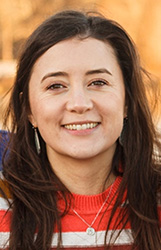Costimulatory Receptors to Advance Immunotherapy
Developing dual costimulatory receptors to deliver CD40, FLT3, OX40, 4-1BB and other function-enhancing signals to antitumor immune cells
Technology Overview
 Dr. Shannon Oda
Dr. Shannon Oda
Tumor heterogeneity and immunosuppressive cells are major obstacles for cancer therapy. Tumors contain cells with different antigens and mutations. This diversity thwarts therapies that target a single antigen, leading to treatment resistance and relapse. Immunosuppressive cells in the tumor microenvironment, including regulatory T cells and myeloid-derived suppressor cells, cause therapeutic T cells to become exhausted and ineffective.
Cancer immunotherapy researcher Shannon Oda, PhD, and team developed dual costimulatory receptor (DCR) cell therapy to overcome the challenges of tumor heterogeneity and immunosuppression. DCRs, a new class of fusion proteins, deliver powerful signals such CD40 to the patient’s own immune cells. CD40 is a key transmembrane protein that reprograms inhibitory immune cells to stop protecting cancer cells and instead attack them.
Dr. Oda and team have a suite of DCRs to provide these immune-enhancing signals, including through CD40, OX40, FLT3, 4-1BB and other receptors. The team is pairing ectodomains of DCRs with a toolbox of endodomains, including novel domains with enhanced efficacy relative to the T cell survival-enhancing signal 4-1BB. The Oda Lab has demonstrated that DCRs significantly enhance therapeutic efficacy in several models of hematological and solid cancers, including pancreatic cancer and melanoma.
DCRs solve multiple cancer therapy challenges, including by:
- Enhancing dendritic cell function: CD40L- and FLT3L-derived DCRs on T cells promote maturation and activation of dendritic cells to present antigens and activate other immune cells. This activity creates a positive antitumor feedback loop within the immune system and is a proven strategy to tackle heterogenous tumors using a multicellular antitumor immune response.
- Improving T-cell persistence: DCR-containing T cells are resistant to exhaustion, promoting long-term activation and functionality in the tumor microenvironment.
- Promoting B-cell activation: CD40L DCRs bind B cells, boosting proliferation and antitumor antibody production.
- Reprogramming inhibitory myeloid cells: CD40L DCRs reprogram macrophages and other inhibitory myeloid cells to promote antitumor activities, including tumor cell phagocytosis. DCR signals recruit other immune cells to the tumor for a robust, diverse immune attack.
The Oda Lab has additional strategies to supercharge T cells and overcome other immunotherapy barriers. They are engineering T cell transmembrane proteins into transform switch receptors (TSR) that convert negative signals to positive ones, enabling T cells to overcome diverse inhibitory tumor microenvironments. TSRs boost T cell metabolism, activation, proliferation, cytokine production and concentration in tumors.
Dr. Oda’s expertise includes developing rigorous assays and screening protocols using human primary cells and conducting in vivo studies with immunocompetent animal models. Her experience includes human clinical trials and industry partnerships. She is interested in collaborations to develop engineering strategies to advance cancer immunotherapy.
Stage of Development
- Preclinical in vitro
- Preclinical in vivo
Partnering Opportunities
- Collaborative research opportunity
- Sponsored research agreement
- Consultation agreement
- Licensing agreement
Publications
- Toumi R, Guenette SJ, Chiu E … Oda S. Advancing adoptive T cell therapy against AML through the development of CD40L-dual costimulatory receptors. J Immunother Cancer. 2023;11(Suppl 1):A439. Outstanding Poster Award.
- Guenette S, Toumi R, Veatch J, Oda S. Dual costimulatory receptors enhance antitumor immunity through cell-extrinsic and -intrinsic signals. Poster presented at: 28th Annual Meeting of the American Society of Cell and Gene Therapy; May 13-17, 2025. New Orleans, LA.
Learn More
